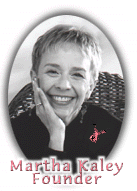The Oxygen's Channel Woman of the Year
Friends... You Can Count On—Martha Kaley
By Cathy Kelly
An Angel at Her Side
From the moment Martha Kaley first found the mass in her breast, someone or something has been standing at her side whispering in her ear, encouraging her, compelling her to move forward, to fight the battle against breast cancer in the most effective way possible. Martha Kaley feels she is being guided, advised and protected by an angel named Matilda. In real life, Matilda takes the form of a gaily-dressed wooden pin that is always displayed on Martha's breast. Spiritually, Martha depends on Matilda's council to guide her journey.
Martha Kaley is the founder and chief advocate for an extraordinary organization called, Friends You Can Count On. This non-profit group was established to raise funds for research regarding an earlier method for detecting breast cancer.
This is a project. If I thought I'd have to do this for the rest of my life, I don't think I could keep going. A bio-marker will be found and a test to detect breast cancer in its earliest stages will be created. That's what keeps me going.
Finding A NicheMartha became passionate about the search for earlier detection methods when she learned how little work was being conducted in that area. I asked a researcher to review with me the grants awarded by the National Institute of Health. Looking through approximately two hundred-fifty grants awarded that year, we could barely confirm that three had been given to researcher seeking new methods for earlier detection of breast cancer. "I was appalled!" says Martha, whose breast cancer was found only by luck and the diligence of her surgeon (See Martha's Story at the end of this article.) With all the money going into breast cancer research, I couldn't believe that no scientists were looking for a way to detect cancer through a biological test. As one researcher told me, you have identified a niche that is not being addressed. When scientists say the bio-markers, the red flags that indicate breast cancer's presence, are hard to find, Martha says, "So, look harder." When they say they haven't had much success in locating the bio-markers, Martha say, "Does that mean you stop looking?" Perseverance would be a good word for her approach. Researchers must be encouraged through financial support to take on a project. There is extensive study on the biology of the cancer cell and better treatment methods being conducted. Technology is growing daily. We must provide the funding to make this area of research attractive so scientists will focus their efforts on earlier detection. Friends doesn't support any one institution, rather we search for promising projects and direct funds to those researchers. Since 1995, Friend You Can Count On has granted almost $650,000 to breast cancer research. It Can't Happen to MeAs amazing as it might sound, only about 25% to 30% of women actually perform a breast self-examination every month. Many women still find their breast cancers by accident. Most women who develop breast cancer don't have even on of the high risk factors indicating a predisposition towards the disease. Regardless of all the articles and books with which women are inundated, there really is no preventative measure that guarantees against developing breast cancer. "None of us is safe," Martha emphasizes "We all hide behind this curtain of invulnerability, believing that it can't happen to us. There is no safety net. We have to take responsibility. Nothing is going to happen unless we take the lead. It is imperative that we make it possible for researchers to detect this disease early, accurately and all-inclusively, for it to be successfully treated and contained for the best hope for survival." |
|




